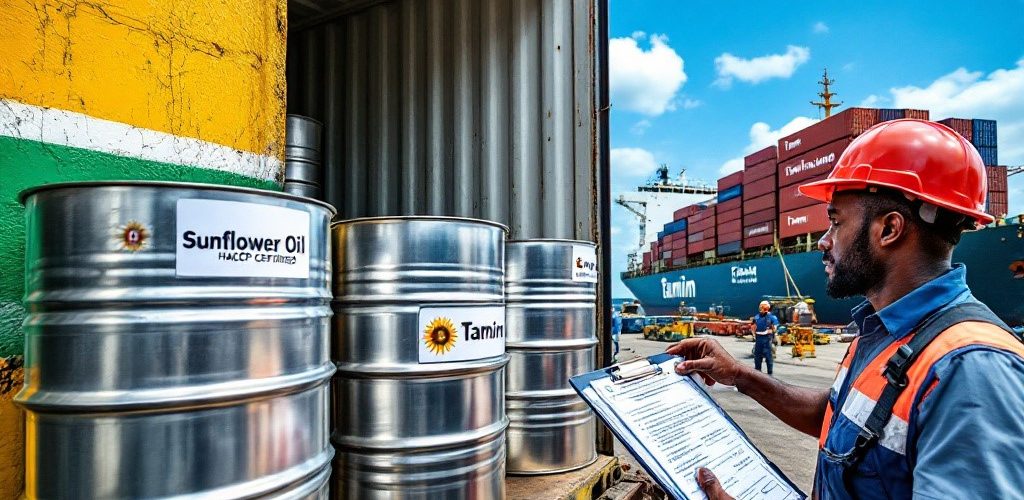Export Edible Oils to Africa 2024: Compliance, Logistics & Profit Guide | Tamim International
Export Edible Oils to Africa 2024; Africa’s edible oil market is projected to reach $12.5 billion by 2027, driven by urbanization and a growing middle class. However, exporters face labyrinthine regulations, port delays, and volatile pricing. This guide equips B2B traders with actionable strategies to profitably export sunflower, palm, and coconut oils to Kenya, Nigeria, and beyond.
Section 1: Africa’s Edible Oil Demand
1.1 Market Breakdown
- Kenya: 80% reliant on imports; 120,000 MT annual sunflower oil demand.
- Nigeria: Palm oil consumption up 7% YoY due to processed foods.
- South Africa: Coconut oil demand growing at 12% CAGR (health trends).
1.2 Key Challenges
- Port Congestion: Mombasa delays average 14 days (vs. 5 in 2020).
- Fraud: 20% of shipments in 2023 had adulterated oils.
Section 2: Compliance Masterclass = Export Edible Oils to Africa 2024
2.1 Certifications
- KEBS (Kenya): Requires EAC Standard DEAS 767:2023 for edible oils.
- SONCAP (Nigeria): Mandates NAFDAC lab testing for aflatoxins.
2.2 Documentation Checklist
- Certificate of Analysis (Moisture ≤ 0.1%, FFA ≤ 0.25%).
- Phytosanitary Certificate (Issued by origin country’s USDA equivalent).
- Commercial Invoice with HS Code 1507.90 (Vegetable Oils).
Section 3: Maximizing Profits
3.1 Bulk vs. Retail Pricing
- Flexitanks: Save 30% vs. drums for 20,000L+ shipments.
- Case Study: A Tanzanian distributor cut costs by 22% using Tamim’s bulk sunflower oil.
3.2 Tariff Mitigation
- EAC Common External Tariff: 10% duty for non-COMESA members vs. 0% for COMESA.
- VAT Exemptions: Kenya waives 16% VAT for oils in 200L+ quantities.
Section 4: Logistics Deep Dive
4.1 Freight Forwarder Red Flags
- No track record in African ports.
- Lack of warehouse networks in Nairobi/Lagos.
4.2 Tamim’s Just-in-Time Model
- Step 1: Pre-stock oils in Dubai/Mombasa warehouses.
- Step 2: Dispatch via Maersk’s weekly Dubai-Mombasa route (12-day transit).
Section 5: 2024 Trends
5.1 Non-GMO Demand
- Kenya’s new labeling laws require non-GMO certification for retail oils.
5.2 Egypt’s Import Quotas
- Caps on palm oil imports to protect local sunflower farmers.
Conclusion
Africa’s edible oil boom offers lucrative opportunities for agile exporters. By partnering with Tamim International, B2B traders can bypass compliance headaches, optimize logistics, and tap into a $12.5 billion market.
Start Exporting to Africa Today!
📩 Request a Quote: Contact us
📥 Download Our Africa Compliance Guide: [shop]
Sunflower Oil exporters, Buy Palm Oil Online, Buy Vegetable oil online
Get more analysis on Africa’s edible oil export


